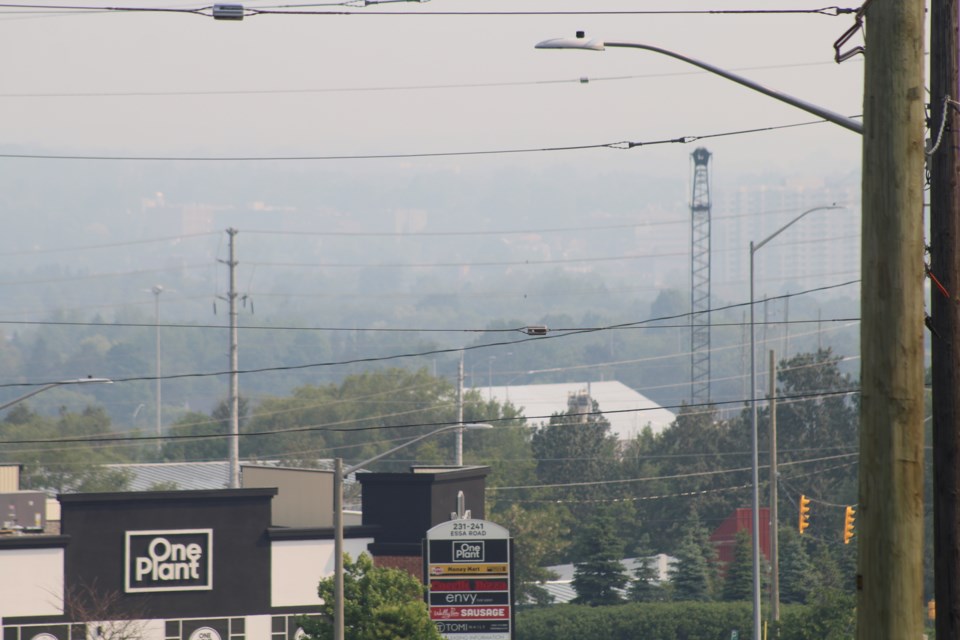Over the past month, Simcoe Muskoka has experienced a higher than usual number of days with poor air quality caused by smoke from wildfires burning in Ontario and Quebec. People are asking more questions about how wildfire smoke and other pollution sources affect outdoor air quality and our health.
Air quality in Ontario had improved after coal-fired electricity plants were decommissioned, but human activity continues to produce greenhouse gases and pollution that affect the air we breathe. Air pollution from a variety of sources, including vehicle emissions, energy production and usage, and wildfires contribute to climate change.
Climate change is the shifting of long-term weather patterns away from what was normal, and its affects are harming human health including in Simcoe Muskoka. These changes are leading to more frequent and severe extreme weather events, including periods of extreme heat, dry weather or drought and shifts in precipitation that increase the risk of wildfires and poor air quality.
Poor air quality affects us all but each person reacts differently. Some people are at greater risk of experiencing negative health effects, including infants and children, pregnant people and their unborn children, people who work or do strenuous activities outdoors, older adults, and people who have existing illnesses or chronic health conditions (e.g., cancer, diabetes, and heart and lung diseases).
The harmful effects of air pollution depend on several factors: the length of time, the amount, and the type of pollution you are exposed to. Short-term exposure can cause headaches, irritate the eyes, lungs, nose and throat, and aggravate existing conditions like asthma. Air pollution can impact the heart, lung, brain and other organs, and can lead to illness, hospitalization and premature death with long-term exposure increasing the risk of developing heart or lung disease and cancer.
Wildfire smoke can be particularly dangerous to health, even at low levels, as it is made up of a complex mixture of particulate matter and gases that can quickly change and travel hundreds of kilometres. Wildfire smoke causes irritation and inflammation and makes it more difficult for lungs to get oxygen into the blood. Smokey conditions can increase the risk of some infections like pneumonia, ear infections and COVID-19. Mild irritation and discomfort are common and usually disappear when the smoke clears.
In the short term, you can protect yourself from wildfire smoke, poor air quality and other overlapping risks like extreme heat, by being prepared and knowing what to do when these conditions occur. Ontario’s Air Quality Health Index (AQHI) is a tool designed to help you understand how changes in the air quality in your area affects your health. When air quality is poor, you can protect yourself by staying indoors and wearing a well-fitted respirator type mask (e.g., NIOSH, N95 or equivalent) if you must be outdoors. If indoor temperatures are comfortable, closing windows and doors will help to keep indoor air clean. If you have an HVAC system in your home, using the highest rated MERV filter for your system (ideally rated 13 or higher) and setting the fan to recirculate air constantly will also help. Information about more ways to protect yourself is available on the health unit’s website.
Improving air quality will take time but individuals, organizations and governments can act and make a difference. Steps such as avoiding unnecessary travel in personal vehicles and not using gas-powered lawn equipment when air quality is poor, can help to “spare the air” and reduce overall air pollution. On a larger scale, people can ask their local, provincial and federal government representatives to stop subsidizing the fossil fuel industry, to invest in greener energy solutions and to create policies that build and support sustainable communities. Together these actions will benefit individual health and well-being, as well as that of our community, economy and environment.
Dr. Charles Gardner is the Medical Officer of Health for the Simcoe Muskoka District Health Unit. To learn more about air quality, climate change and other public health topics, visit smdhu.org.



